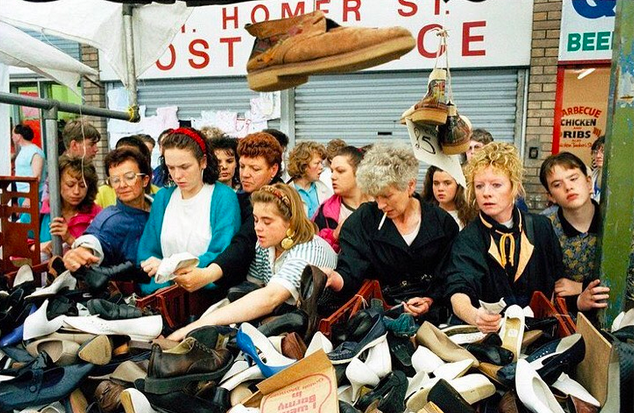Couldn’t get a Eurovision ticket? No wonder

Online touts used software to jump the queue, and now tickets are re-selling for up to £12,000
Dear readers — happy Monday to all 13,911 of the beautiful souls receiving this newsletter. And an only slightly happier Monday to the 935 extra-beautiful souls paying for it. Today we’ve got a typically bumper edition, which includes the following, and so much more:
- The Big Story, about why you failed to get a Eurovision ticket and how ticket touts are exploiting a grey area in the law.
- Your Monday Briefing, with developments in the battle of the Rimrose Valley bypass and questions about the true power broker in the local Labour Group.
- Weather warnings issued for ice and snow today and tomorrow.
At the weekend, our Historic Murder Correspondent Leo Hardwick took on the case of Julia Wallace, whose unsolved killing many decades ago has puzzled detectives and true crime fans alike. Leo wasn’t quite able to crack the case, but he did write a beautiful piece about it. You can read it here if you haven’t already.
Last week paying members received two great editions. On Tuesday writer and PhD student Rachel Collett took us to Liverpool’s swashbuckling, boss-less feminist bookstore, News from Nowhere, whose presence on Bold Street has withstood five decades of change. Then on Friday we were back among the murky world of local politics, speaking to councillor Maria Toolan a week after her explosive resignation from Labour on Twitter. Here’s a section:
“[Toolan] described her experience in the Labour Group as ‘traumatic’ and criticised the local party’s ‘astounding incompetence’. She said her Labour colleagues had made a “series of baseless complaints” against her and that her own ‘allegations of sexual harassment against another councillor’ had not been resolved.”
Editor’s note: We’re still 65 members shy of the 1000 mark, so we’ll need a big push if we’re to get over the line this month. This week we’re heading inside The Athenaeum, Liverpool’s storied private member’s club, that’s in tomorrow’s edition. Then we have a juicy political exclusive lined up for Thursday. If you wish to read those, and all of our content, then sign up to our own private member’s club today. It isn’t quite as exclusive as The Athenaeum, and we don’t have a bust of William Roscoe’s head, but it is extremely reasonably priced at £7 a month (or £65 a year).
This week’s weather
Monday ⚠️ Gusty winds and light rain showers with highs of 12°C. Weather warning issued for ice and snow.
Tuesday ⚠️ Sleet showers and a fresh breeze with highs of 6°C. Weather Warning issued for ice and snow.
Wednesday 🌦️ Light rain showers and a gentle breeze with highs of 7°C
Thursday 🌧️ Light rain and a moderate breeze with highs of 10°C
Friday 🌧️ Light rain and a gentle breeze with highs of 11°C
Weekend 🌧️ Light rain and a gentle breeze with highs of 9°C
This week’s weather forecast is sourced from BBC Weather and it’s for Liverpool.
The big story: The scourge of the ticket touts
Top line: If you wanted a ticket to Eurovision in May, you were almost certainly out of luck. An hour or so after tickets went live last week, Liverpool was awash with disappointment. The reason, as is so often the case for large scale events in a cyber-oriented world, was digital touts. These were the headline stats:
- 6000 tickets for the grand final sold out in 36 minutes
- 64,000 tickets for the rehearsals and semi-finals were gone in 90 minutes
gutted. Travelled all over Europe to watch Eurovision over the past 30 years. Can't get a ticket in my home town. Sad times. Well done if you got some.
— SevenStreets (@7streets) 12:42 PM ∙ Mar 7, 2023
Ticketmaster acknowledged that “a very small number of fans experienced issues accessing the queue”, but the real issue soon became clear. Tickets were soon emerging on sites like Viagogo for vastly inflated prices.
- Former Lord Mayor Gary Millar had this to say: “If choosing to profit from selling Eurovision tickets today, you are basically profiteering from a war.”
- And Andrew Earnshaw, who runs Eurovision podcast Eurobliss, told the BBC: "I can deal with it, because I did my best — but at the same time I'm absolutely gutted — and it's not just me, it's all of my friends.”
The software: The BBC’s You and Yours programme investigated the situation and found that software was being used to queue-hop, with touts — some as young as 17 — able to write code that “can penetrate the online queuing system”. On the face of things this is nothing new, digital touts have been around for a long time, but there was something different. Rather than bulk buying, which is illegal, the software mimics multiple people at once and undertakes multiple separate transactions, thus exploiting a grey area in the law.
According to Matthew Gracey-McMinn, who works for anti-bot company Netacea and who spoke to You and Yours, even a basic laptop can mimic thousands of people. Computers with greater processing power sometimes utilise cloud servers to achieve far larger numbers. The BBC described it like this:
“You have to imagine that you’re standing in a long queue of fans outside the stadium… the queue snakes around the stadium with thousands waiting in good, happy, cheerful order to buy their four tickets. Now imagine dozens of people sailing past you, barging their way into the front of the queue, but not only that, they bring hundreds of their mates.”

The Golden Circle is the name of one company formed to provide this software to its members. It’s run by 34-year-old Londoner Josh Silverman, who has used bots to jump online queues for 10 years. It has tiers of membership, with £99 a month for a basic subscription up to a “very secretive” Tier Three membership, which is said to help its members do this full-time, rather than as a “side hustle”. Silverman says this in a promotional video for his software:
“Golden Software is a queue handler, so imagine you’ll have a few hundred people in the queue for you when Ticketmaster releases an event that has 20,000 people in the waiting room. The software tries to put you to the front and generally gets a load of people through for you. It will then send a URL to your discord where you can then go to cart the tickets”.
Is it legal? The government’s Digital Economy Act of 2017 clearly states that it is illegal to use software to buy more than the ticket limit allowed by the promoter or venue. However, due to the lack of bulk buying in this case, the legality is something of a grey area. The BBC asked a number of bodies, including the government, and said it couldn’t get a clear answer. The result of all of this is much more black and white though. There are now Eurovision tickets selling online for the Grand Final for prices in the region of £12,000. Best of luck.
Your Post briefing
The intense battle of Rimrose Valley rages on, with the £250 million bypass planned to go through the country park in Sefton now on hold until 2025 at the earliest. The project, first launched in 2017 to improve access to the Port of Liverpool and ease the extreme congestion along the A5036, has evoked the ire of campaigners who fear its environmental impact. Hundreds turned out to protests against it in 2021, including MPs Bill Esterson and Peter Dowd. A podcast was even set up to oppose the new road. Transport Secretary Mark Harper said a number of factors, including "environmental challenges", design changes and supply chain price hikes linked to the ongoing war in Ukraine, were responsible for the delay.
Murphy’s Law: Who really runs the local Labour Party? According to our sources, there is “no question” that Sheila Murphy is the person in charge, and there’s irritation in some parts of the Labour Group at her prominence in the party. Murphy — a former party director who has been overseeing the local Labour Group since 2021’s damning Hanson Report — has easy access to the Cunard Building despite ostensibly not being a council figure and is said to be close to David Evans, the general secretary of the national Labour Party under Sir Keir Starmer. Murphy is said to have been a key figure pushing Anthony Lavelle’s challenge to replace Ian Byrne as West Derby MP (who the source says is likely “being lined up for a seperate MP role”) as well as removing several councillors in the wake of the parking ticket scandal.
There was no mention of Liverpool in the government’s latest funding announcement for “creativity industry clusters”. In a speech two weeks ago, Culture Secretary Lucy Frazer namechecked Belfast as a growing centre for film and Leamington Spa for gaming which, crucially, are supposed to be among Liverpool’s greatest strengths (Liverpool has an abundance of exciting interactive entertainment companies, such as Firesprite and Ripstone, and — such is the supposed prominence of its growing film studio prowess — has been nicknamed the “Hollywood of the North” by its leaders). Liverpool is not one of the already-funded clusters, which include places like York, so concerns are the city has missed out on funding in an area where it could be thriving.
Wirral council leader Jannette Williamson spoke out against a 60-strong group of anti-migrant protestors who gathered outside the Grove House hotel in Wallasey on Friday, calling it “shocking and disappointing”. 40 counter-protestors were also at Grove House — which is currently being used to house asylum seekers — but the event was far tamer in nature than the one in Knowsley that made national headlines a few weeks back and attracted members of organised far-right groups, with no reports of trouble. Posters circulated online displayed slogans such as “refugees welcome illegal immigrants aren’t” and “close the borders to stop the boats and protect our women and children”.
Home of the week

Fans of hot tubs, Liscard and perfectly symmetrical homes may well enjoy this perfectly symmetrical home with a hot tub in Liscard. It also has four bedrooms, a sunny rear garden with a lawn and an open plan kitchen-diner. It’s on the market for £350,000.
Post Picks
🖼️ The Common, a painting of a 12 figures defined by rich pinks and blues, “thronging among a vibrant backdrop of foliage” (so said the Guardian) was Kathryn Ryan’s ticket to the £25,000 John Moores prize back in 2020. You can now see all of her best work in Under a Hot Sun at the Walker Gallery. More here.
🎶 “Music not for the faint of heart,” at Future Yard on Friday night. George Crumb’s cult piece Black Angels (with themes of “death, destiny and obsessive spirituality”), written in 1970 as a Threnody — or lament — to the Vietnam War, is being reimaged by Manchester Collective for the benefit of the gig-going Birkenhead public. General admission is £16.50.
♟️ Or if you’d prefer a Friday without themes of “death, destiny and obsessive spirituality”: how about board games at a botanical cafe in Kensington. Dave’s Botanical Coffee Shop is a non-profit pop-up, so any monies made are reinvested back into the community. Take a look.
😂 Open mic night at Hot Water Comedy Club on Hardman Street. It’s like a lottery of laughter, you might catch a seasoned pro, you might get a total chancer. Go easy with the heckles. Book tickets here.
Our favourite reads
Does Liverpool spend too long submerging itself in the miseries of the past? Are phrases like “managed decline” and “Scouse not English” worn so thin as to be thread-bare? Perhaps not, argues Patrick Devaney in this piece for Liverpolitan, positing that the shared experiences of hard times are what forges a city together. Written in rebuttal to a previous Liverpolitan piece which argued that Liverpool should stop “banging on” about the times gone by, Devaney says the past is in fact ever more precedent, with “Austerity 2.0” looming large. “The idea of being ‘Scouse, not English’ stems from a history filled with gunboats on the Mersey, contrition over our role in the slave trade, and solidarity and action,” he writes.
Looking “beyond the passion and myth,” this BBC long-read tells the famous story of the Welsh-speaking village of Capel Celyn — famously drowned to provide drinking water for Liverpool nearly 60 years ago — through the eyes of Betsan Powys, a journalist who grew up with the tale. For a Welsh perspective, she writes, losing a decade-long battle to save the village was “proof of Wales' political impotence, always out-voted and out-muscled by its more powerful neighbour.” From Liverpool’s POV, however, it's a different story; more water was seen as a necessity to improve poor housing conditions and thousands of people would benefit from the relocation of a few hundred. A controversial topic six decades on.
And one for the art aficionados. The London Review of Books takes you on a tour of the Turner Prize nominees, a few weeks before their artwork leaves Liverpool’s docks; from winner Veronica Ryan’s not-quite-outsider art to Ignrid Pollard’s deft compositions, placing “images, objects and bodies in uneasy relation”. The Turner has been subject to criticism in recent years, with one nominee in 2021 saying artists of colour had been under-represented and a push to abolish the upper-age limit for artists (which occurred this time around). The fact that both Ryan and Pollard are women in their sixties, associated with the British Black Arts Movement of the 1980s, tells a story of reform in itself.
Photo of the week

Greatie Market in the 90s. Back before it was hustled off to Dryden Street while Great Homer Street got a retail park and a 24-hour McDonalds. Photo by the brilliant Tom Wood.
Letters from readers
For a long time now Labour has ruled Liverpool without a real threat. The clique at the top are old hands who trust each other, support each other, cover for each other and huddle together when attacked. It’s not sinister, it’s not ‘Left’ or ‘Right’, it’s just human nature. It would be good if they could recognise the problem and allow some new blood in. Let us hope they do, ‘Maria Toolan: Why I quit Labour’, Mick Kelly
I thoroughly enjoyed reading this article, Leo. As a young child (I’m now 64!) my father used to tell this story to my brother and I, dwelling often on the facts of Wallace “creating” his alibi by speaking to so many people about Menlove Gardens East. Your article has brought back both my childhood and my Dad…..Thank you! ‘Chess, prank calls and murder: who really killed Julia Wallace?’, Jane Tyndall

Comments
Latest
‘Cutthroats and sell outs’: An editor’s note about Laurence Westgaph’s threats
Ian Byrne: Why the country — not just Liverpool — needs the Hillsborough Law
The ‘charisma bypass’: Why Liverpool’s leaders are so forgettable
The Mersey’s clean-up cost £8 billion. So why is it still so dirty?
Couldn’t get a Eurovision ticket? No wonder
Online touts used software to jump the queue, and now tickets are re-selling for up to £12,000